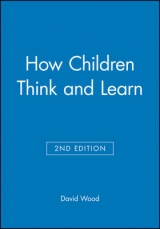
How Children Think and Learn
Seiten
1988
Blackwell Publishers (Verlag)
978-0-631-16139-4 (ISBN)
Blackwell Publishers (Verlag)
978-0-631-16139-4 (ISBN)
- Titel erscheint in neuer Auflage
- Artikel merken
Zu diesem Artikel existiert eine Nachauflage
Explores views about how children think and learn. The book outlines Piaget's theory of cognitive development and explores some of his major critics. It goes on to consider what contemporary issues in education can gain from them.
This book explores views about how children think and learn. It outlines Piaget's theory of cognitive development and explores the views of some of his major critics. Did Piaget underestimate children's intellectual abilities? Did he misconstrue the relationships between language and thinking? Does his theory misguide the teacher? The author compares Piaget's approach with those offered by Bruner, Vygotsky and other researchers, considering points of disagreement and establishing areas of common ground. But these ideas stand or fall on the contribution that they can make to those actually working in the classroom. The author therefore goes on to consider just what pressing contemporary issues in education stand to gain from them. Do children's accents and dialects contribute to their success or failure at school? What is the value of literacy and why do some children have such problems in reading and spelling? Why does an understanding of mathematics prove so elusive for many children? These are just some of the issues of practical relevance to this book.
This book explores views about how children think and learn. It outlines Piaget's theory of cognitive development and explores the views of some of his major critics. Did Piaget underestimate children's intellectual abilities? Did he misconstrue the relationships between language and thinking? Does his theory misguide the teacher? The author compares Piaget's approach with those offered by Bruner, Vygotsky and other researchers, considering points of disagreement and establishing areas of common ground. But these ideas stand or fall on the contribution that they can make to those actually working in the classroom. The author therefore goes on to consider just what pressing contemporary issues in education stand to gain from them. Do children's accents and dialects contribute to their success or failure at school? What is the value of literacy and why do some children have such problems in reading and spelling? Why does an understanding of mathematics prove so elusive for many children? These are just some of the issues of practical relevance to this book.
From Pavlov to Piaget; images of childhood; stages of development?; learning how to think and learn; language and learning; making sense; the literate mind; the mathematical mind; education and educability.
| Erscheint lt. Verlag | 26.5.1988 |
|---|---|
| Reihe/Serie | Understanding Children's Worlds |
| Zusatzinfo | bibliography, indices |
| Verlagsort | Oxford |
| Sprache | englisch |
| Maße | 150 x 230 mm |
| Themenwelt | Geisteswissenschaften ► Psychologie ► Allgemeine Psychologie |
| Geisteswissenschaften ► Psychologie ► Pädagogische Psychologie | |
| Geisteswissenschaften ► Psychologie ► Verhaltenstherapie | |
| ISBN-10 | 0-631-16139-2 / 0631161392 |
| ISBN-13 | 978-0-631-16139-4 / 9780631161394 |
| Zustand | Neuware |
| Haben Sie eine Frage zum Produkt? |
Mehr entdecken
aus dem Bereich
aus dem Bereich
Techniken der Verhaltenstherapie
Buch (2024)
Julius Beltz GmbH & Co. KG (Verlag)
35,00 €



